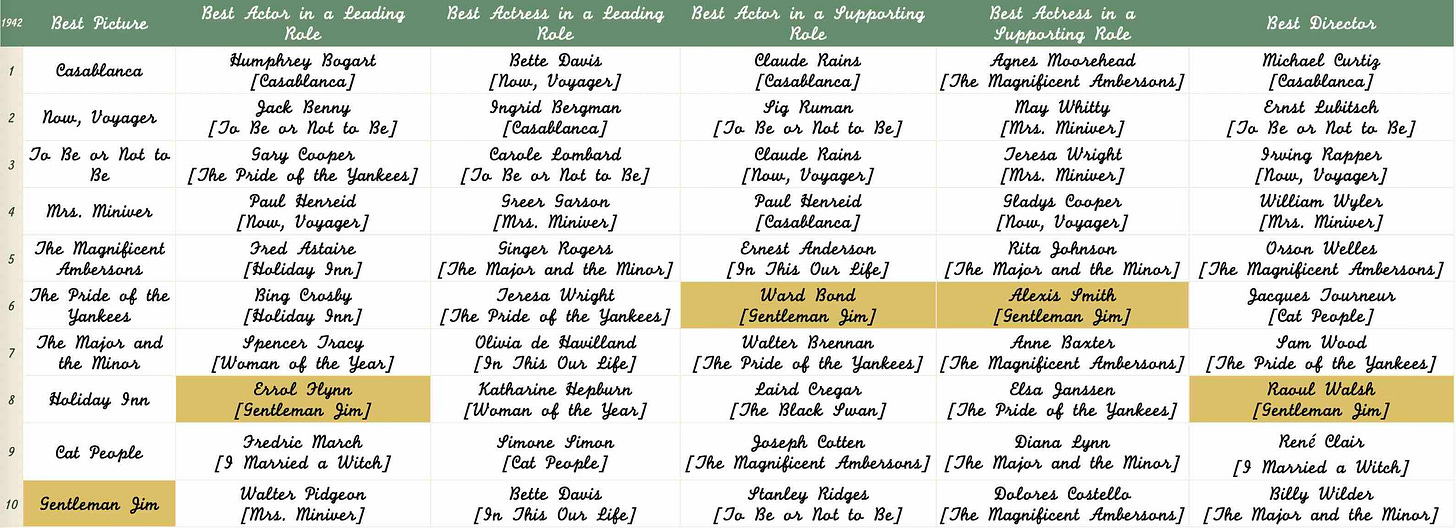A hubris-soaked, hagiographic motion picture about James J. Corbett (1866-1933), an American World Heavyweight Champion, GENTLEMAN JIM is headlined by an ever-so-jaunty-and-carefree Errol Flynn, who rises through the rungs of the pugilist hierarchy as easy as falling off a log (or more precisely, sundry logs), without one single frame of his supposedly backbreaking training scenes being presented, nor there is any mention of the savagely brutalizing effects of the bloody sport.
Deeply rooted in Hollywood’s go-to precepts of feel-goodism and promulgating the can-do spirits of the so-called“American Dream”, Raoul Walsh’s film carries off a total personality shift on James, whose quieter, more self-effacing nature is supplanted by Flynn’s trademark larger-than-life panache and confidence, selling to audiences that it is his opportunistic canniness, affable temperament and sheer chutzpah, rather than his pugilistic faculty, which is implied to be hard-wired in his Irish extraction, should take the main credit for his runaway success. While the belligerent, uncouth coming-to-blow roughhousing of the Corbetts is singled out to risibly counterpoint James’s more suave and world-savvy carriage. He is nothing like his opponents, all hulking brutes of unwieldy physical force, but a social butterfly endowed with super brawn and nimble footwork to vanquish any number of the aforementioned opponents, including John L. Sullivan (Bond), the title-holder who is dethroned by James in the climax, and Bond, on top of his usual impetuousness, also appears uncharacteristically courteous and concedes his defeat with a moving gesture of sportsmanship near the coda.
The only one who finds James’s bloated ego insufferable is Victoria Ware (Smith), a wealthy socialite who goes out of her way to see him being put into his place. But the film never grants her that wish, the smooth-sailing of James’s winning streak really sabotages any attempt for a nip-and-tuck grudge match. Instead, the pair’s constant squabble can only ineluctably lead them to the alar, where else? Still, Smith is rebellious enough to high-hat a smarmy Flynn and sport bespoke fineries to assert her own attitude before capitulating to that class-barrier-dismantling romance in the last minute.
As regards the match sequences, Walsh capitalizes on rapid editing, gung-ho reaction shots, swiftly alternating between closeups and long shots to mask the amateurish boxing movements. Naturally, visceral potency of every punch is too much to ask for a film made in the 1940s to deliver, and Flynn’s fit physique is noticeably too slim to pass as a heavyweight. However, James is a role befitting his screen image, a paragon of a “winner” in every possible way. Flynn isn’t cut out for a slugfest, but to charm, to entertain, to hook his audiences, and it is undeniable that his seemingly spontaneous and sustained bonhomie is quite infectious. As a biopic, GENTLEMEN JIM is fraud; as a sport flick, it barely offers any excitement, but as a crowdpleaser, it is almost faultless. Walsh knows exactly how to cook up a swell balm for folks who need some “true” stories to believe in, however specious that scare-quoted adjective is.
referential entries: Walsh’s WHITE HEAT (1949, 8.4/10); Vincent Sherman’s ADVENTURES OF DON JUAN (1948, 7.0/10).
Title: Gentleman Jim
Year: 1942
Genre: Biography, Drama, Sport
Country: USA
Language: English
Director: Raoul Walsh
Screenwriters: Vincent Lawrence, Horace McCoy
based on James J. Corbett’s autobiography
Music: Heinz Roemheld
Cinematography: Sidney Hickox
Editor: Jack Killifer
Cast:
Errol Flynn
Alexis Smith
Jack Carson
Alan Hale
Ward Bond
John Loder
Minor Watson
William Frawley
Rhys Williams
Dorothy Vaughan
Arthur Shields
Pat Flaherty
James Falvin
Marilyn Phillips
Wallis Clark
Madeleine Lebeau
Rating: 6.9/10






